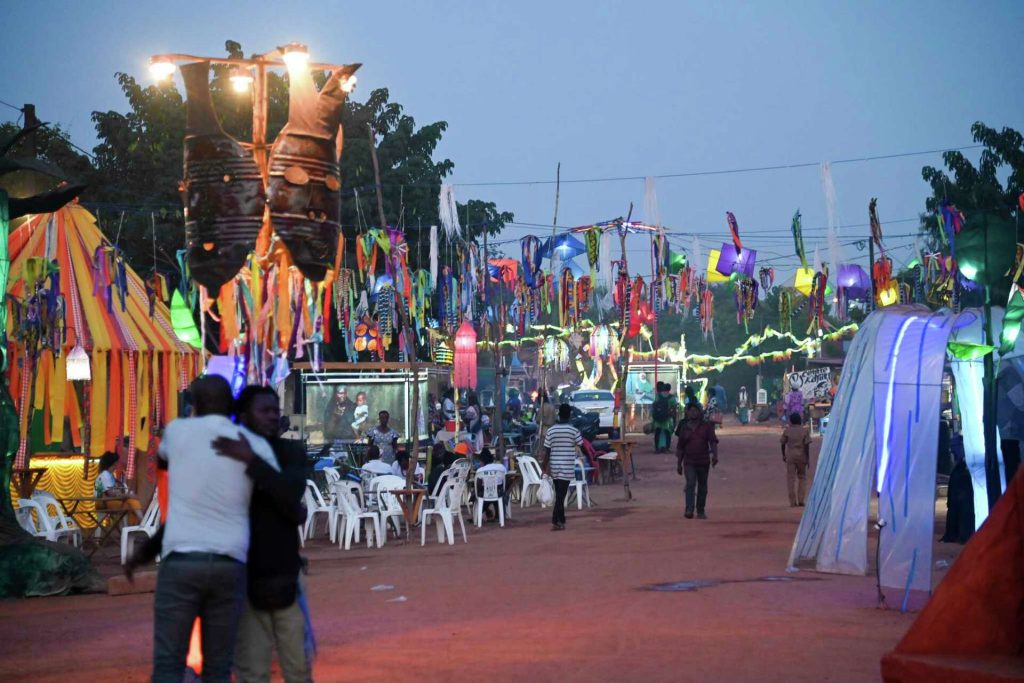Theater festival offers solace in Burkina Faso
3 min read

The past three years have been incredibly difficult for Fanta Charlotte Dabone, a mother of three from Burkina Faso. She fled her home after extremists attacked her village, leaving behind her husband and farm. Since then, she has been on the move, struggling to secure enough food for her children, including a 2-year-old toddler, and to afford basic necessities like rent.
But last month, Dabone experienced something extraordinary: for a week, she became a queen.
Along with other Burkinabe men and women displaced by extremist violence, Dabone performed in front of captivated audiences at Recreatrales, an international theatre festival held in Ouagadougou, the capital. For nearly two hours each day, she danced, swirled, and chanted, immersing herself in the energy of the moment. “When I’m on stage, I’m very happy,” she said, smiling. “It’s only when I have to go home that the difficult thoughts return.”
Burkina Faso, a landlocked country of 23 million people in the Sahel region, used to be known for its vibrant arts scene. The country hosted internationally recognized film and theatre festivals, and was famed for its skilled artisanship. However, recent years have brought a dramatic shift. Burkina Faso is now at the center of the security crisis in the region. Violent extremist groups, coupled with military forces battling them, have devastated the country, causing widespread instability. The violence has spilled over from neighboring Mali, while the two military coups since 2022 have left the government struggling to stabilize the situation.
Today, more than 60% of the country is outside of government control. Over 2 million people have been displaced, and nearly 6.5 million people rely on humanitarian aid to survive. Despite these grim circumstances, Recreatrales—one of the few festivals still able to take place—managed to go ahead in the capital’s Bougsemtenga district, known locally as the “happiness district,” and an area where art and community spirit are strong.
Bougsemtenga lived up to its name this year, transforming into a whimsical celebration that felt like a blend of a traditional village festival and a dreamlike fantasy. Over 150 African and European artists performed, and more than 4,500 theatre lovers gathered, temporarily escaping the harsh realities outside.
For some performers, like Claude Ilboudo, 30, the festival represents not only hope for Burkina Faso but also a personal journey. Ilboudo grew up in Bougsemtenga and began dancing at Recreatrales during its very first edition. He had worked as a glazier, but after a serious injury to his hand five years ago, he found himself unable to continue his job. It was during his recovery that he discovered a passion for theatre and eventually joined the Recreatrales team.
“Recreatrales is hope for me, and it’s hope for the neighborhood,” Ilboudo said, reflecting on the significance of the festival. “It gives us a chance to express ourselves and remind the world of our resilience.”
Aristide Tarnagda, the artistic director of Recreatrales, expressed a similar sentiment. Despite the escalating insecurity in the country, he was determined that the festival would go on. “Theatre affirms the primacy of life over death,” Tarnagda said. “Gathering to perform and watch theatre is a form of resistance. It is an act of defiance against adversity and violence. This year’s theme, ‘Turning the Face to the Sun,’ embodies that spirit.”
The festival, in many ways, symbolizes the resilience of the Burkinabe people who continue to fight for their culture and their future despite the ever-present threats of violence and displacement. For many, like Dabone, it also offers a momentary escape from the anguish of daily life. Though the country remains embroiled in conflict, Recreatrales has become a beacon of hope, where art and community offer solace, unity, and a reminder of the strength of the human spirit.